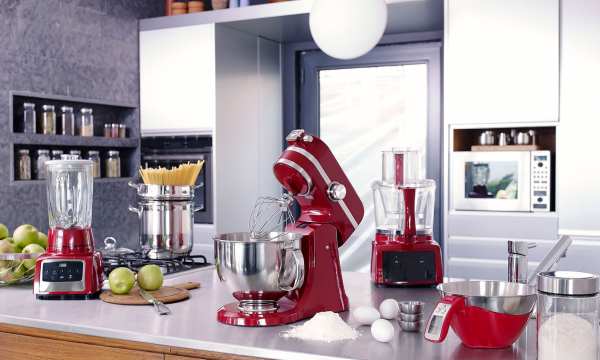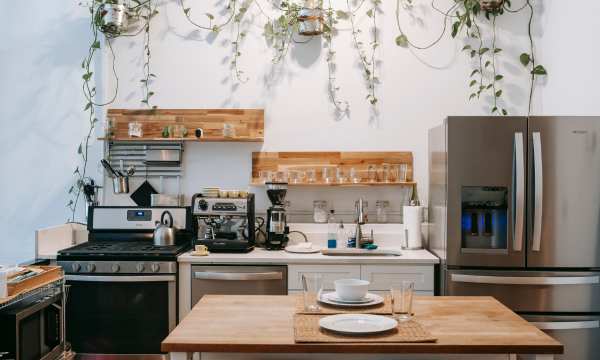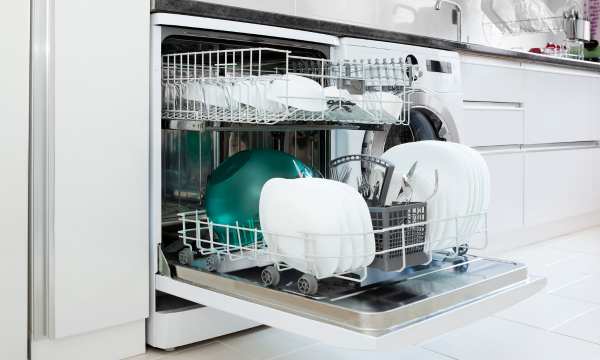Green Kitchen: Choosing Energy-Efficient Appliances
Choosing tools that use less energy is the first step in making your kitchen greener.
Ad
The kitchen is the heart of the home, so it is an important part of daily life and has a major impact on your ecological footprint. In this guide, we’ll discuss some important things to consider when choosing energy-efficient kitchen tools.
1. Energy Efficiency Ratings:
When shopping, make sure to check the Energy Star rating of your kitchen appliances. Energy Star is a program that certifies that products meet strict American standards. Environmental Protection Agency standards for energy consumption. The label states that the device uses less energy than regular models, which means lower electricity bills and less damage to the environment.
Ad
2. Refrigerator
The refrigerator is one of the most energy-consuming kitchen tools. Look for models with high energy efficiency ratings, good insulation, and features like dual evaporators to keep the refrigerator and freezer at different temperatures. Consider the size of your refrigerator; a larger one can use more energy than it needs.
3. Dishwashers:
It is best to choose a dishwasher with a high energy factor (EF). Look for models with sensors that vary cycle length based on load size and degree of soiling. This makes full use of water and energy. To save even more energy, choose a dryer with a ‘no heat’ drying setting or an air drying setting.
4. Cooking Utensils:
- Induction hob: A gas hob or electric hob usually consumes more energy than an induction hob. They heat pots and pans directly via an electromagnetic field, reducing heat loss and speeding up the cooking process.
- Ovens that use less energy: Convection ovens move hot air to cook food faster and more evenly. To save as much energy as possible, look for a model with accurate temperature settings and good insulation.
- Microwave: Microwave ovens use less energy for heating small quantities. You can use them for tasks that don’t require a large oven, often saving energy.
5. Energy-saving Lighting:
Choose LED or CFL lamps (compact fluorescent lamps) for the kitchen. These options use less energy, last longer, and produce less heat than traditional incandescent bulbs. Place work lights in certain work areas to prevent them from being too bright and wasting energy.
6. Smart Devices:
Buy smart appliances with improved energy-saving features. For example, smart thermostats can make refrigerators and freezers work better, and smart dishwashers can be set to run during off-peak hours when electricity prices are lower.
7. Water-Efficient Appliances:
When selecting machines, consider their energy and water consumption. Look for washing machines and dishwashers with a good water factor (WF). These machines use less water. To save water in the kitchen, repair leaks immediately and install aerators on the faucets.
8. Care and Maintenance:
For optimal functionality and energy efficiency, regular maintenance is a must. Range hoods, freezers, and dishwashers all have filters that need to be cleaned or replaced as instructed. To increase heat exchange efficiency, keep the coils at the back of the refrigerator clean.
Conclusion
To create a green kitchen, you need to choose your tools carefully. When you make energy efficiency a priority, you will not only help the environment, but you will also save money on your energy bills in the long run. Stay up to date with the latest developments in eco-friendly technology and build your kitchen in a way that reflects your commitment to the environment. Remember that small changes to your kitchen can have big benefits for your home and the environment.
FAQs
1. What do Energy Star ratings mean when purchasing kitchen appliances?
If an appliance has an Energy Star rating, it means that it meets the strict energy efficiency standards set by the United States. EPA. If you buy appliances with this certificate, you can save money on energy bills and have a smaller impact on the environment.
2. What can I do to ensure that my refrigerator uses less energy?
Look for models with features like dual evaporators, good insulation, and high energy efficiency ratings. Also consider the size of your refrigerator, as larger refrigerators may use more energy than you actually need.
3. What should I pay attention to with a machine that uses less energy?
Choose a dishwasher with a high energy factor (EF) and sensors that vary the program duration based on the amount of load and the amount of dirt on the dishes. Instead of using heat, choose a model that can air dry clothes or on a setting without heat.
4. Are induction hobs more energy efficient than regular stoves?
Yes, induction hobs use less energy because they heat food directly with an electric field, meaning food cooks faster and less heat is lost.
5. How can I save energy in my oven?
For faster and more even cooking, choose a convection oven that moves hot air. To save as much energy as possible, look for a model with accurate temperature settings and good insulation.
6. Why are LED and CFL lamps suitable for kitchen lighting?
LED and CFL bulbs use less energy, last longer and produce less heat than regular incandescent bulbs. They help reduce energy consumption and damage to the planet.
 Budget Kitchen Appliances with Quality
Budget Kitchen Appliances with Quality
In this busy world, having well-functioning and reliable kitchen tools is important for a smooth cooking experience. […]
More Mastering Cooking: A Guide to Kitchen Ovens and Ranges
Mastering Cooking: A Guide to Kitchen Ovens and Ranges
The oven and stove are the most important parts of any kitchen. Ad Cooking is both an […]
More Effortless Cleaning: The Ultimate Dishwasher Buying Guide
Effortless Cleaning: The Ultimate Dishwasher Buying Guide
Ease of use is very important these days and a dishwasher can make work in the kitchen […]
More